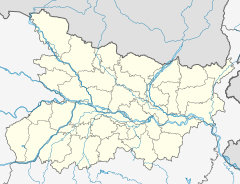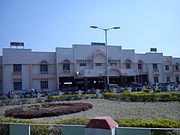Katihar Junction railway station
| Regional rail & commuter rail station | ||||||||||||||||||||||||||||||
 The main entrance of the station | ||||||||||||||||||||||||||||||
| General information | ||||||||||||||||||||||||||||||
| Location | Station Road, Katihar-854105, Bihar | |||||||||||||||||||||||||||||
| Coordinates | 25°32′55″N 87°33′58″E / 25.54869°N 87.56615°E | |||||||||||||||||||||||||||||
| Elevation | 35 metres (115 ft) | |||||||||||||||||||||||||||||
| Owned by | Indian Railways | |||||||||||||||||||||||||||||
| Operated by | Northeast Frontier Railway | |||||||||||||||||||||||||||||
| Line(s) | ||||||||||||||||||||||||||||||
| Platforms | 9 | |||||||||||||||||||||||||||||
| Tracks | 14 | |||||||||||||||||||||||||||||
| Connections | Taxi, auto-rickshaw | |||||||||||||||||||||||||||||
| Construction | ||||||||||||||||||||||||||||||
| Structure type | Standard (on-ground station) | |||||||||||||||||||||||||||||
| Parking | ||||||||||||||||||||||||||||||
| Bicycle facilities | ||||||||||||||||||||||||||||||
| Accessible | ||||||||||||||||||||||||||||||
| Other information | ||||||||||||||||||||||||||||||
| Status | Functioning | |||||||||||||||||||||||||||||
| Station code | KIR | |||||||||||||||||||||||||||||
| Zone(s) | Northeast Frontier Railway | |||||||||||||||||||||||||||||
| Division(s) | Katihar | |||||||||||||||||||||||||||||
| History | ||||||||||||||||||||||||||||||
| Opened | 1889 | |||||||||||||||||||||||||||||
| Electrified | 2016 | |||||||||||||||||||||||||||||
| Previous names | East Indian Railway | |||||||||||||||||||||||||||||
| Passengers | ||||||||||||||||||||||||||||||
| 100K/day ( | ||||||||||||||||||||||||||||||
| Services | ||||||||||||||||||||||||||||||
| ||||||||||||||||||||||||||||||
| Other services | ||||||||||||||||||||||||||||||
|
| ||||||||||||||||||||||||||||||
| ||||||||||||||||||||||||||||||
Katihar Junction railway station serves Katihar city in Katihar district in the Indian state of Bihar. It is an A1 Category railway station of Katihar Division. The Katihar Junction railway station is connected to most of the major cities in India by the railway network. It is amongst the top 100 booking stations of Indian Railways.[1]
Katihar lies in between Barauni–Katihar section of Barauni–Guwahati line
Katihar–Siliguri line which serves the city with numerous trains to Guwahati, Kolkata, Delhi, Muzaffarpur, Patna, Gorakhpur, Lucknow and with many other cities. It is ISO certified ISO 14001:2015 for its clean and green environment throughout the station premises.[citation needed]
History
[edit]East Indian Railway Company opened the Manihari–Katihar–Kasba section in 1888 and the North Bengal Railway opened the Katihar–Raiganj section the same year. The Barsoi–Kishanganj section opened in 1889. All these lines were 1,000 mm (3 ft 3+3⁄8 in)-wide metre-gauge lines. Darjeeling Himalayan Railway, operating 2 ft (610 mm) narrow-gauge lines, extended their operations from Siliguri to Kishanganj in 1915 and to Dalkhola.
Siliguri was connected to Kolkata via the eastern part of Bengal since 1878 (for details see Howrah–New Jalpaiguri line). However, with the partition of India in 1947, railway services in the region were completely disrupted. In 1949, the narrow-gauge Siliguri–Kishanganj section was upgraded to metre gauge. Thus there was a direct metre-gauge connection from Manihari to Siliguri via Katihar.[2] The importance of Katihar station grew because of the jute mill in the region.
Development
[edit]In the early 1960s, when Farakka Barrage was being constructed, Indian Railways took the initiative to extend 5 ft 6 in (1,676 mm) broad-gauge rail link from Kolkata.[2]
The 2,240 m (7,350 ft) long Farakka Barrage carries a rail-cum-road bridge across the Ganges. The rail bridge was opened in 1971 thereby linking the Barharwa–Azimganj–Katwa loop to Malda, New Jalpaiguri and other railway stations in North Bengal.[3][4]
Gauge conversion work (from metre gauge to broad gauge) in the Barauni–Katihar section was taken up in 1978–79 and completed in 1982.[5]
The Siliguri–Katihar line was the last surviving metre-gauge line in the area. The Aluabari Road–Katihar section already had a broad-gauge line running alongside the metre-gauge line. The Aluabari Road–Siliguri section needed to be converted. Conversion work was taken up in 2008; train services in the section were suspended and conversion work was completed early in 2011.[6][7][8]
Station facilities
[edit]The following services are available in Katihar Jn. railway station:
- 10 (02 bedded) AC retiring rooms

- 05 (02 bedded) non AC retiring rooms

- 01 (08 bedded) AC dormitory

- 04 (01 bedded) AC cabin dormitory

- 01 (06 bedded) non AC dormitory

- Executive lounge
- High speed Google railwire free Wi-Fi service

- Upper class/lower class waiting rooms with free Wi-Fi/AC/TV/charging points/drinking water & separate ladies'/gents' washrooms

- Food plaza

- Tea stall

- FOB with 4X
 escalator/elevators
escalator/elevators  3X
3X - CCTV surveillance

Platforms
[edit]There are eight functional platforms at Katihar Junction which are interconnected and have multiple foot overbridges.
Gallery
[edit]References
[edit]- ^ "Indian Railways Passenger Reservation Enquiry". Availability in trains for Top 100 Booking Stations of Indian Railways. IRFCA. Archived from the original on 10 May 2014. Retrieved 30 December 2012.
- ^ a b "India: the complex history of the junctions at Siliguri and New Jalpaiguri". IRFCA. Retrieved 12 November 2011.
- ^ Saxena, R. P. "Indian Railway History timeline". Archived from the original on 14 July 2012. Retrieved 20 November 2011.
- ^ Salman, Salman M. A.; Uprety, Kishor (2002). Conflict and cooperation on South Asia's international rivers: a legal perspective. World Bank Publications. pp. 135–136. ISBN 978-0-8213-5352-3. Retrieved 5 July 2011.
- ^ Rajendra Saxena. "Details of New line, Gauge conversion & Doubling constructed after independence & in progress on Indian Railways". item No. 18. irse. Archived from the original on 9 July 2012. Retrieved 24 January 2012.
- ^ "Delayed but new route helps trains". The Telegraph. 29 September 2011. Archived from the original on 3 February 2013. Retrieved 10 December 2011.
- ^ "Railways to partially restore Siliguri–Bagdogra service". The Times of India. 16 March 2010. Archived from the original on 3 January 2013. Retrieved 10 December 2011.
- ^ "IRFCA photo gallery". IRFCA. Retrieved 10 December 2011.
External links
[edit]- Katihar Junction railway station at the India Rail Info
| Preceding station | Following station | |||
|---|---|---|---|---|
| Terminus | Northeast Frontier Railway zone | Dandkhora towards ?
| ||
| Northeast Frontier Railway zone | Kumedpur towards ?
| |||
| Northeast Frontier Railway zone | Semapur towards ?
| |||
| Northeast Frontier Railway zone | Mansi towards ?
| |||
| Northeast Frontier Railway zone | Dalan towards ?
| |||






